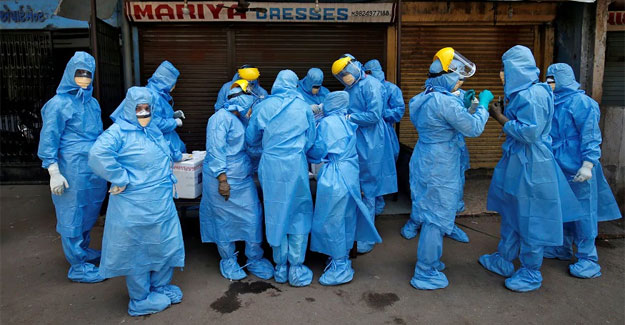
How India Became The Second Largest Supplier Of PPE In Two Months
Due to Covid-19 pandemic, a new market, estimated to be worth at least Rs 10,000 crore, has popped up from nowhere. Starting from practically nothing only two months ago, India has now become the world's second-largest supplier of medical personal protective equipment (PPE). These are products like goggles, face-shields, masks, gloves, coveralls and gowns, head and shoe covers. In 60-odd days, the industry has grown 56 times, according to a recent report by Invest India, a company set up by the government to facilitate investments. Over 600 companies in India are certified to produce PPE. These include textile biggies such as Arvind, JCT Mills, The Trident Group, Welspun and Shahi Exports. India today manufactures 4.5 lakh pieces of PPE a day, and now the country is well-positioned to seize a share of the global market, which will be US$ 60 billion by 2025. Prompt action How did the industry gather itself so quickly? Many give credit to the swiftness with which the government acted. Harish Ahuja, Chairman and Managing Director of Shahi Exports, recalls getting a call from the Textiles Secretary in early April. Noting that Shahi Exports' 58 plants in the country have been lying shut due to the Covid-19 pandemic, the Secretary asked Ahuja if he could take up the manufacture of coveralls - protective gowns, made of special, non-woven fabric. Shahi Exports swung into action. Though only five of its 58 plants needed to be pressed into service and only 750 of its 1.2 lakh employees were used for the purpose, the company now makes 20,000 coveralls a day. It has so far supplied close to nine lakh pieces to HLL Lifecare of Kerala, the central government's agency for medical procurement. The story is the same across the industry. A nudge from the government, an appeal for helping the country in the time of crisis and a new business opportunity when none else existed, seem to have done the trick. "The textile industry working closely with the Government of India created an entire industry from scratch," Kulin Lalbhai, Executive Director, Arvind Ltd, said. Arvind makes 15,000 coveralls a day from its plants in Bengaluru, Ahmedabad and Ranchi. Making the shift As is always the case, there were challenges. Before Covid-19, the PPE industry in India was very small, and all the raw material used to be imported from China. But when the pandemic broke out and imports were not possible, the industry had to quickly develop a domestic supply chain. "We have been able to work with our suppliers to shift a large part of the supply chain to India," Lalbhai said. Ahuja notes that today all the raw materials, with the sole exception of sealing tapes, are available in India, which puts the country at an advantage over the principle competitors, Vietnam and Cambodia. Of course, it helped that the industry already had the equipment. "Fortunately, we had all the machines needed to produce the coveralls," Ahuja said. Shahi Exports, which is among the top textiles and garments exporters in the country, was also making rain-proof clothing. Likewise, Arvind was also into technical textiles - for which there was a big push in the recent Budget. The company used to make protective clothing for oil and gas, medical and automotive industries. Thus, to ramp up medical PPE was but one step. Growing market The Defence Research and Development Organization lists over 275 companies certified to make medical covralls (the DRDO has been in the forefront for developing counter-Covid-19 products and licensing them for free to the industry). Ninety-five manufacturers are supplying coveralls to HLL Lifecare. Most of them are not as big as Arvind or Shahi. Many such as Grassroot Markmen of Delhi started fresh into this business. Grassroot, which has just begun production, says it will soon manufacture 3,000 coveralls a day. Today, India has an inventory of 15.96 lakh PPE kits (of all kinds) and another 2.22 crore kits are being manufactured against firm orders by the industry, according to the Invest India report. Bengaluru has become a major PPE hub, where half the production happens. The rest of it is spread across the country-Tirupur, Coimbatore, Chennai, Ahmedabad, Vadodara, Ludhiana, Bhiwandi, Kolkata, Noida and Gurugram.
Textile Excellence
If you wish to Subscribe to Textile Excellence Print Edition, kindly fill in the below form and we shall get back to you with details.












